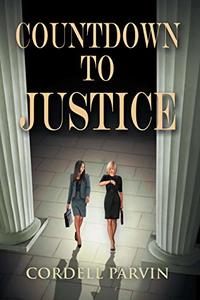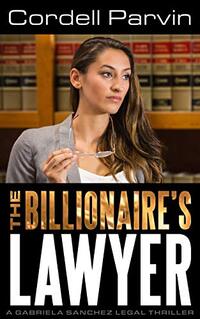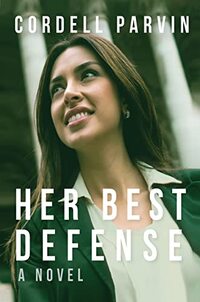Genre:
Crime Fiction- Country: United States
- Books: 3
- Profession: Lawyer
- Member Since: Apr 2020
- Profile Views: 8,708
- Followers: 30
- VISIT AUTHOR: Website, Amazon, Linkedin,
Cordell Parvin practiced law for 38 years developing a national construction law practice. In 2005 he left his law firm to coach, teach and mentor young lawyers. He has written business parable books for lawyers and is now writing courtroom dramas involving his protagonist, Gabriela Sanchez.
Cordell Parvin's Books
Stay in the loop on books by Cordell Parvin. See upcoming and best-selling books by the author here. You'll also find the deals on books by Cordell Parvin.
** Please note that the information or price displayed here may not be the updated. Make sure to double-check the latest book price before buying books.
** Also, there might be other books by Cordell Parvin not listed on AllAuthor.
| Book |
|---|
Cordell Parvin's Series in Order
It's exciting to find a book series to follow! Discover the whole new world of book series created by Cordell Parvin.
** Also, there might be other book series by Cordell Parvin not listed on AllAuthor.
Gabriela Sanchez
1
Cordell Parvin Interview On 05, Apr 2024
 "Cordell Parvin, with 38 years of experience in law, cultivated a renowned national construction law practice before transitioning to coaching, teaching, and mentoring young lawyers in 2005. Known for his insightful business parable books tailored for legal professionals, Parvin now delves into the realm of courtroom dramas, crafting compelling narratives featuring his protagonist, Gabriela Sanchez."
"Cordell Parvin, with 38 years of experience in law, cultivated a renowned national construction law practice before transitioning to coaching, teaching, and mentoring young lawyers in 2005. Known for his insightful business parable books tailored for legal professionals, Parvin now delves into the realm of courtroom dramas, crafting compelling narratives featuring his protagonist, Gabriela Sanchez."
I had my very best year as a lawyer financially in 2004. I was on top of my world and had exceeded goals I had set for myself. I had spent my career with the top goal of helping my clients succeed in their business and stay out of trouble I had done that. I didn’t need any more accomplishments to feel fulfilled. I asked my large law firm leadership if I could be responsible for our attorney development program and they agreed thinking I would only be figurehead and the staff would do all the work. My first task was to welcome our new partners, meaning our top young lawyers. I asked a simple qyestion to start my presentation: “How many of you have a business plan with goals for 2004?” Out of seventeen none raised their hand. To which I responded with a quote attributable to many people: “That’s okay. When you aim at nothing you hit it with amazing accuracy.” I told our firm’s leaders I wanted to help the next generation. A year later I found helping develop the next generation of lawyers to have successful and fulfilling careers. I gave up lots of money for feeling like I was making a greater contribution.
Can you share the key lessons or principles from your national construction law practice that have been most valuable in your coaching and mentoring role?Stephen Covey once said “Begin with the End in Mind.” I always had an end in mind. But, I also valued the journey up the mountain far more than reaching the top of it. My goal was to become the top construction lawyer in the United States. I can’t necessarily say I was the top. But, as I believe I was the best known. I wanted to become the top coach of junior lawyers in the United States. That was my idea of keeping climbing up the mountain as I worked hard to achieve it. As I said earlier, in each case my primary goal was to help clients and later young lawyers succeed.
Your books for lawyers are described as business parables. What motivated you to convey legal lessons through this storytelling approach?I got the idea from Ken Blanchard. Blanchard | Leadership Development Training & Consulting His business parable books made sense to me. I wrote three business parable books and then I wrote “Prepare to Win,” which was more of a how to book.
How do you believe your experiences in construction law uniquely position you to understand and address the challenges faced by young lawyers in the field?I played three sports in high school and baseball in college. I always had a coach, They were able to bring out the best in me. In law school one professor served the same role. When I started my law practice, I had a mentor, but he wanted me to do work for his clients and didn’t want me to develop my own law practice. Among other things, my mentor told me I had to be in Rotary Club. So I joined and hated it. When I broke away I spent hours of what I later learned were wasted doing things that didn’t work for me. I learned by trial and error how I could make a difference. I understood the challenges young lawyers faced raising a family and working to be successful. I took particular interest in young women lawyers who as mothers had even greater challenges. They had no time to learn by trial and error. They both needed and wanted to be focused like a laser beam on what would work for them. I helped guide them to figure that out.
Gabriela Sanchez is the protagonist in your courtroom dramas. What inspired the creation of this character?I was inspired to create Gabriela Sanchez for four primary reasons. I knew from the beginning what her background would be. But I’m not sure which was most important. First, After my father finished B-17 missions in WW2, he came back and was stationed in Laredo to teach Mexican pilots. He became fluent in Spanish. He was an artist and painted many portraits of Mexican people. We vacationed throughout Mexico in our car. So, he influenced my interested in the border and the culture. Second. our son-in-law is Mexican American and grew up in the Rio Grande Valley. A math teacher took him under his wing and by the time he finished high school he earned a scholarship in computer engineering at Ohio State. Our daughter taught school in the Valley and that’s where they met. Third, one of the most favorite young lawyers I mentored grew up in the Rio Grande Valley. She once told me that the only way she was able to go to law school was when Notre Dame called her to offer a scholarship. She told me she was only Hispanic student and many of her classmates thought she was there because of Affirmative Action and that motivated her to be a top student. So, guess what Gabriela was the only Latina student in Notre Dame law school in my novels. Finally, these are very round numbers and likely changing: Mexican-American women make up about seven percent of the US population, but are less than 1/2 of one percent of the partners in US law firms. That means those who make it face unique challenges, among which is who to have as a role model.
In your coaching and mentoring, what common challenges have you observed among young lawyers?One big challenge is making time for the activities that will make them successful and fulfilled. I once wrote this: Suppose you sleep 8 hours a night, or 56 hours a week. Suppose you bill 40 hours a week and you invest another 10 hours a week on your career development, client development and other firm activities. That leaves 62 waking hours of personal time for family, fitness, community, church, recreation, hobbies, commuting and other activities. How you spend the 10 hours a week (or whatever number) of investment time will ultimately determine the quality of your career. How you spend the 62 hours (or whatever number) of family and personal time will ultimately determine the quality of your life and family relationships.
As an author of both non-fiction books for lawyers and fictional courtroom dramas, how do you balance imparting practical advice with creating engaging narratives?I’m pretty good at giving practical advice. I enjoyed a lengthy and enjoyable career. Without much guidance, I’wasted time on things that didn’t help me succeed, and I sometimes failed. I know what both success and failure feel like. I’m just learning to create engaging narratives. As a lawyer I was very left brain analytical. Writing novels I’m trying to be more right brained. As I said earlier my father was an artist. He was also a colorful writer. Our daughter has his talents. When she writes a story that I read I feel like I’m in a movie theater when I am reading because she has a way of describing that I wish I had. Remember my mountain climbing analogy. I have a long way to go up the mountain to become the writer I want to become. At age 76, I’m striving to become a better writer.
What do you believe sets your courtroom dramas apart from other legal fiction?I’m not sure my courtroom dramas are set apart from others. Readers have told me they find the courtroom scenes which I have in each book interesting. I hope my character, Gabriela Sanchez, captures some of the challenges Latina lawyers face in their careers, especially in the courtroom
How has your background in construction law influenced the themes and storylines in your courtroom dramas?It’s actually my experience helping clients and trying cases that has influenced the themes of and storylines in courtroom dramas. ABC Wild World of Sports TV show used to begin with a visual and narrative describing the “Thrill of Victory and the Agony of Defeat." I’ve experienced both.
Can you share a specific anecdote or case from your legal career that has had a lasting impact on your approach to coaching and mentoring?The last case I tried, which will be the last case I ever try, we spent weeks working seven days a week preparing for what would turn out to be four week trial. It’s a long story. The shortest version I can offer is I was up most of the night because I couldn’t sleep before cross-examining the other side’s expert withess. Finally it came to me, almost out of no where. I could prove he was lying about something that was incredibly important to the other side’s case. I was likely breathing heavy while waiting to cross-examine the witness. Shortly before lunch, it was my turn. I asked several times if he was sure about what he was telling the court. He replied yes and then I sprung it on him. You could have heard a pin drop afterwards. We settled the case over lunch for $7.5 million payable to my client. I learned in my career that each person is different, with unique talents and challenges. One way I identified differences is the Meyers-Briggs test. I’m an ENFP. Only a small percentage of lawyers have that personality type. Another way to find unique talents is called the StrengthsFinder test. I learned I hated details and got bored quickly, but my unique talent and personality type enabled me to see what other’s missed. In that case the lie told by the witness I discovered. In coaching if I knew a young lawyer's results of those two tests I could figure out how to best help that lawyer.
What challenges did you face when transitioning from a legal practitioner to an author, and how did you overcome them?I’m still working to overcome my challenges. I mentioned earlier that I’m analytical. I spent forty plus years thinking analytically .My one challenge was to become more creative in my writing. To become a better writer I took classes at the local community college. I took on-line classes. I became insatiable reading how to books and blogs. Donald Maass, the famed New York editor spoke at the Dallas Writers Conference one year. I went thinking I’d be bored. After three hours in my seat taking detailed notes I was sad he had finished. I was so impressed that I paid to go to New York for an all-day seminar he taught. I’ve since read every book he has written. I’m also a big fan of Shawn Coyne and his Story Grid.
How do you stay updated on current legal trends and developments, and how does this knowledge inform your coaching and writing?I do research. COVID changed many things. Artificial Intelligence is changing many things.
Your focus is on coaching and mentoring young lawyers. What advice do you find yourself giving most frequently to those starting their legal careers?Each day strive to learn and become a better lawyer more valuable to your clients.
How has the legal landscape changed since you began your career, and how do you address these changes in your coaching and writing?Wow. I had to send a fax recently and I went to Fed Ex to send it since I no longer had that capability. A young guy helped me otherwise I would still be standing at the machine. That experience brought me back to changes. I could not type when I started law practice. There were no ATM machines. I had to get cash from the American Express store. There was no internet. We had huge libraries of books. I had a pager. I could go on. Here’s what I wrote in a blog post:
In 1976, I finished four years as an USAF lawyer and I started my career in private practice in Roanoke, Virginia. I was incredibly excited about living and practicing law in Roanoke, The Star City of the South. In addition I appreciated living only 37 miles away from Blacksburg, Virginia and Virginia Tech. In the 70s, unlike today, we could leave for a Virginia Tech football game 40 minutes before kickoff and be in our seats before the kick-off.
My initial salary was $14,000. I thought that was a lot of money. My billable rate was initially $35 an hour. I could not believe anyone would be willing to pay that much for my legal work. Having spent five years in the Air Force, I only owned one suit that I purchased for $195.00. I had to make monthly payments for a year to pay for it. The senior lawyers in our firm wore hats. So, I purchased one, but I never felt comfortable wearing it.
Most Roanoke law firms did insurance defense work, among their many practice areas. Young lawyers tried subrogation cases every week in the General District Court. Even though the trials were bench trials, we gained valuable experience making opening statements and closing arguments, guiding our witnesses through direct examination and cross-examining the other side’s witnesses. I also tried several jury trials in the Circuit Court in the 70s. I remember trying several cases without having conducted any discovery.
Practicing law was both easier and more difficult then. Think about practicing law with no computers on desks, no cell phones, no email, no blogs, no social media, no iPads, no search engines, no ATM machines. On the one hand it was easy to get away from work. On the other, it was very difficult to do any meaningful work from home. If I needed to do legal research, I routinely had to go to the Roanoke Bar law library or a law school library. When I found what I needed, I stood over a copy machine and copied each page. I mentioned not having ATM machines because two times when I was out of town, I discovered that I had no money. Each time I had to find the closest American Express office and be the first customer the next morning.
There were no women lawyers in our firm. I don’t remember any in the 70s in other Roanoke firms. I hired the first woman lawyer in the 80s after a friend and I started our own firm.
How did you first come across the AllAuthor website? What do you like or dislike about the site?I believe I learned about the site at the Dallas Writer’s Conference or one of the classes I took. What I like best is the help with finding the best editors or marketing professionals.
Ask Cordell Parvin a Question
Have brimming questions to ask author Cordell Parvin? Ask whatever you like, but keep it appropriate.
** Please note that unanswered questions will not appear on the page. Refrain from posting promotional messages.
Contact Cordell Parvin
The author, a good book and you! Contact Cordell Parvin here.
** Please refrain from spamming and don’t bombard the author with promotional mails/messages. Your IP/Email address may be blocked if found doing so.
Contact Author on:
Linkedin,



